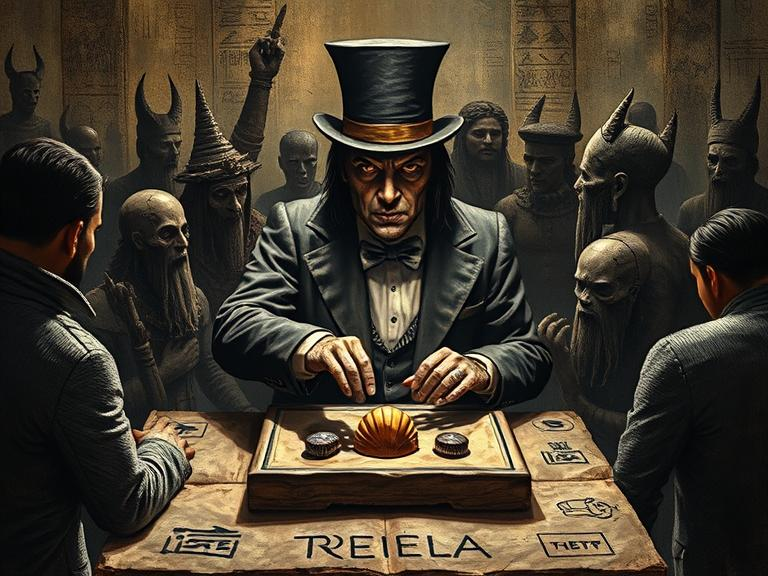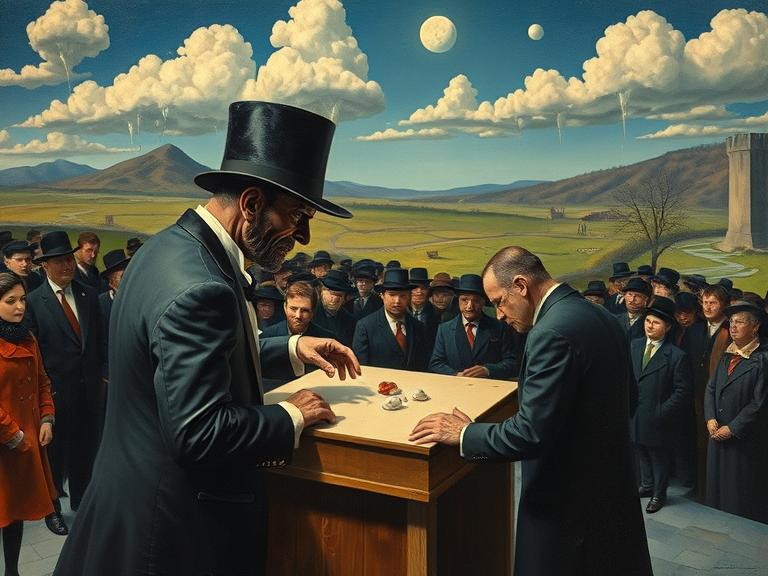
Look, I’ve seen it from both sides of the makeshift table. Maybe I even ran a game or two back when my knuckles were quicker and my morals… well, let’s just say they were more flexible. You see the setup: some guy – let’s call him the “operator” or the “mechanic” – with three shells, or three cards, and a little pea, or the money card. He’s moving them around, talking smooth, making it look easy. “Follow the lady,” he says, flipping the queen between two spot cards. “Where’s the pea?” he asks, sliding those walnut shells like they’re greased.
You watch. You think you’re smart. Faster than this street bum. You follow it. Once, twice. Damn, you think, I saw it that time! It’s definitely under the middle shell. And maybe it is. Because the first taste has to be free, or at least cheap.
But here’s the first secret they don’t tell you in Con Artist 101, because there ain’t no such class, only hard knocks: The sleight-of-hand is often the least important part of the trick. Yeah, you heard me. Sure, the operator needs some dexterity. Needs to be able to make the pea vanish or palm the queen without looking like he’s got arthritis. But the real magic? The real grift? It happens around the table, and inside your head.
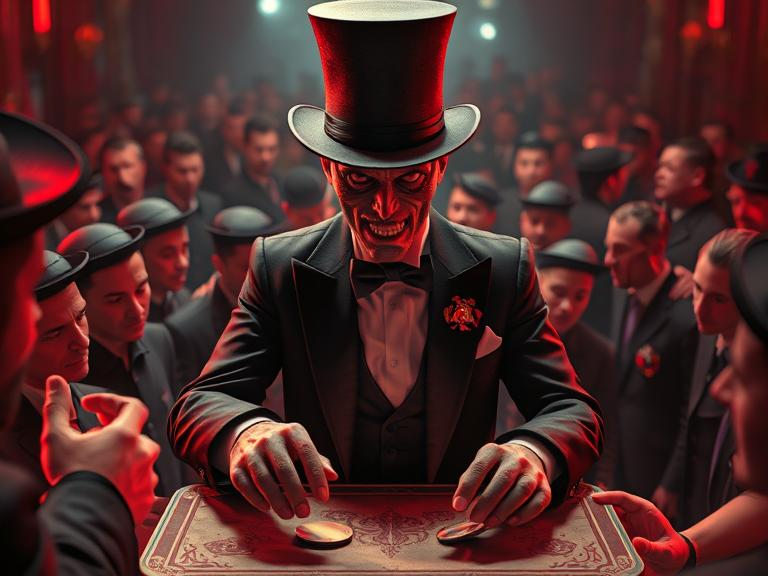
Think about the scene. It’s never just the operator. There’s always a small crowd. And who’s in that crowd? Lemme tell you: Shills. Call ’em sticks, call ’em boosters, call ’em whatever you want. They’re actors. They’re part of the crew.
There’s the guy who “wins” loudly right before you step up. He collects his cash, maybe flashes a roll, talks about how easy it is. That’s Social Proof 101, folks. Makes you think, “If that dummy can win, I definitely can.” He just greased your slide into stupidity.
There’s the other shill who argues with the operator, creating a diversion at the exact moment the real move happens. Or the one who bumps into you slightly, just enough to break your concentration for that split second the pea actually gets clipped away or the card gets switched. Your eyes can only look at one thing at a time, right? Basic physics. Basic biology. They know that. They use it. Your attention is a spotlight, and they’re the stagehands pointing it wherever they damn well please.
And then there’s the biggest player at the table: Your own damn ego and greed. You want to believe you’re smarter. You want the easy money. That desire, that little itch of avarice, it clouds your judgment faster than cheap whiskey. You stop thinking critically. You start believing. You want to see the pea under the shell you picked, so your brain helps you see it, even if it ain’t there. Confirmation bias, the pointy-heads call it. On the street, we just called it being a mark.
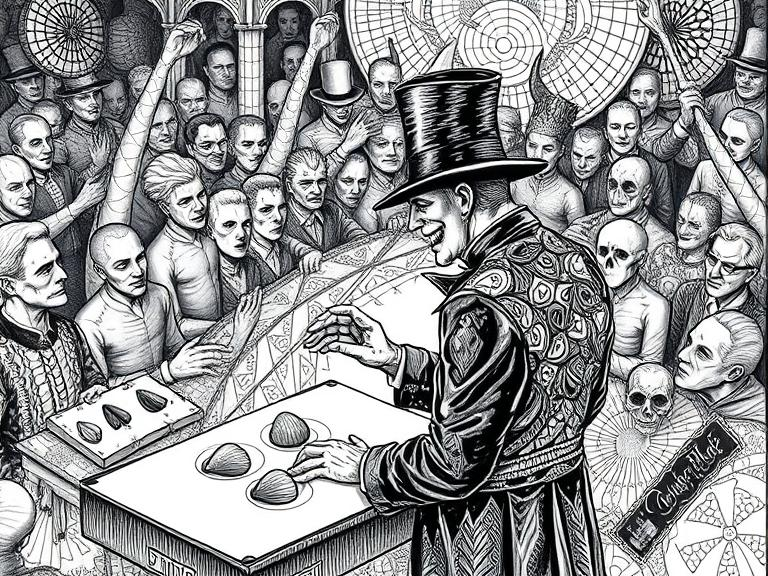
The operator isn’t just shuffling shells; he’s playing you. He controls the pace, speeds it up when you’re getting close, slows it down to build false confidence. He reads your body language – the way your eyes fixate, the way you lean in. He knows when you’re hooked.
Remember Orson Welles, the big guy with the voice? He knew a thing or two about fakes and showmanship. He understood that people are more willing to believe a grand illusion than a simple truth. The shell game is a pocket-sized version of that. It’s theater. Street theater where you pay for the ticket and lose your shirt in the final act.
And don’t tell me you’re too sophisticated for this. Don’t tell me you wouldn’t fall for it. Because you fall for it every single day.
Where are the shills now? They’re called influencers, pushing crypto scams or miracle supplements with fake testimonials. They’re the bot armies hyping a stock or a political narrative. They’re the sponsored posts blending seamlessly into your feed, making you think that curated, perfect life is real and achievable, if you just buy this one thing.
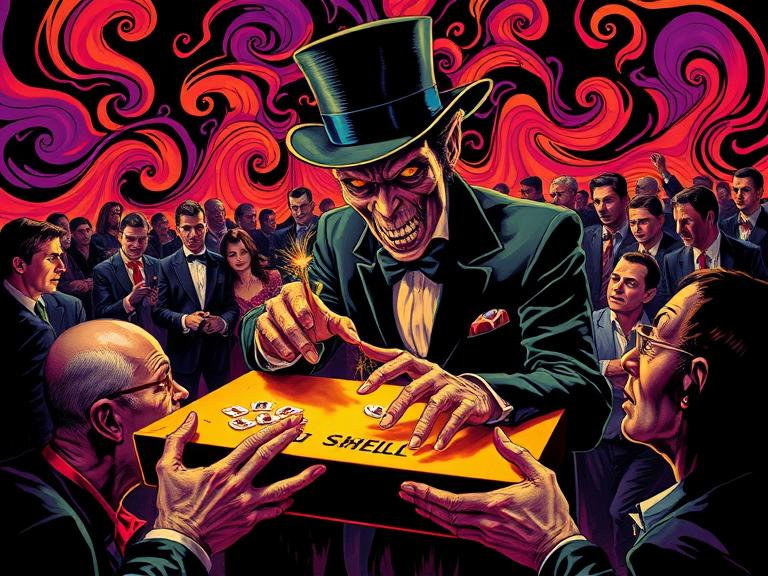
Where’s the operator? It’s the algorithm, baby. Designed by PhDs, not street hustlers, but using the exact same principles. It controls the pace, feeding you bite-sized hits of outrage or dopamine. It directs your attention with notifications, clickbait headlines, endless scrolling. It learns what triggers your greed, your fear, your ego, and feeds you more of it. Misdirection? That’s the whole damn business model! Keep you looking at the curated feed, the manufactured outrage, the viral dance challenge – anywhere but at the data being harvested, the privacy being eroded, the actual substance being hollowed out.
What’s the pea? It’s whatever they want you to chase. The hot stock tip. The political conspiracy. The fear of missing out (FOMO – just another word for the mark’s panic). The promise of belonging if you just join this group, hate that group, buy this product. They keep you guessing, keep you clicking, keep you scrolling, always thinking you’re about to find the pea, about to hit the jackpot.
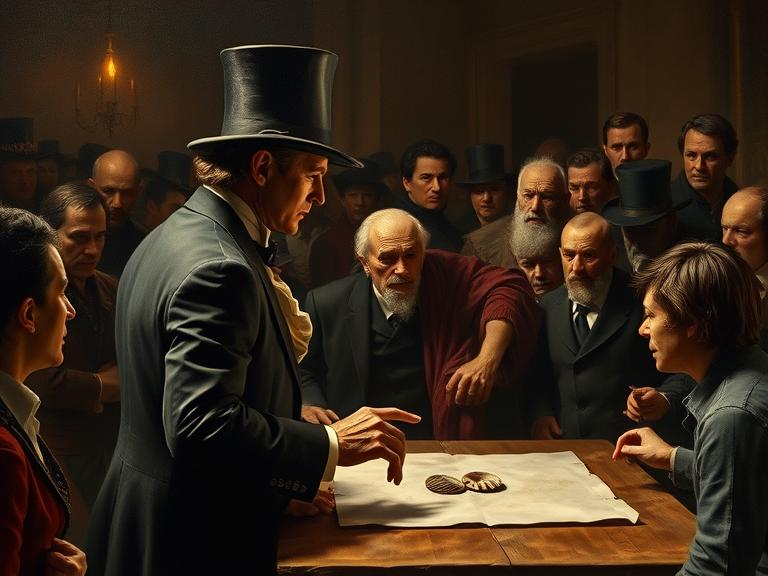
The sleight-of-hand? It’s buried in the terms of service nobody reads. It’s in the complex financial instruments nobody understands. It’s in the political doublespeak that Carlin used to shred so beautifully – language designed to obscure, not clarify. “Enhanced interrogation” sounds better than torture, right? “Quantitative easing” sounds smarter than printing money till it’s worthless. Same game. Bigger table.
They exploit the same cognitive biases:
- Social Proof: Everyone else is doing it/believing it! Look at the likes!
- Authority Bias: This expert/influencer/blue checkmark says so!
- Scarcity: Limited time offer! Act now before it’s gone!
- Commitment & Consistency: You’ve already scrolled this far, liked this page, invested this much time… might as well keep going.
It’s exhausting, isn’t it? Like watching those shells blur together until your eyes cross. That’s the point. Wear you down. Keep you chasing.
So, next time you think you’re too smart for the Shell Game, look around. Look at your phone. Look at the news. Look at the ads. The game didn’t disappear. It just scaled up. It put on a suit, maybe got a venture capital round. But underneath? It’s still just three shells, a pea, and a whole crowd of people – some paid, some just hopeful suckers – making sure you keep your eyes exactly where they want them, which is anywhere but on the damn pea.
The only winning move? Sometimes it’s refusing to play. Sometimes it’s just tipping your hat to the operator, acknowledging the grift, and walking away with your wallet still in your pocket. Because trust me, the house always wins? That wasn’t invented in Vegas. It was perfected on a dirty piece of cardboard on a street corner, long, long ago. And they’re still taking suckers to the cleaners every single day. Don’t be one of them. Watch the whole game, not just the shiny object they’re waving in your face.
